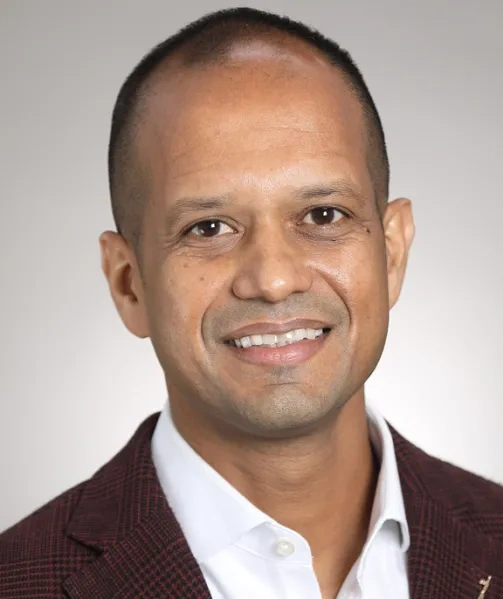
Prashant
Chittiboina, MD
Surgeon-in-Chief, NIH Clinical Center
Investigator, Neurosurgery Unit for Pituitary and Inheritable Diseases, NINDS
301-496-2921
Dr. Prashant Chittiboina, a clinical investigator in the NINDS Neurosurgery Unit for Pituitary and Inheritable Diseases, is the Surgeon-in-Chief at the NIH Clinical Center.
MD, Goa University
MPH, Idaho State University
Dr. Chittiboina was appointed Surgeon-in-Chief at the Clinical Center in January 2023. The Surgeon-in-Chief plays a vital role in ensuring patient safety at the Clinical Center. In this role, Dr. Chittiboina oversees all surgical activities, provides strategic planning for surgical care and works to improve surgical quality and safety protocols throughout the hospital. In this role, Dr. Chittiboina shares his time between NINDS and the Clinical Center.
He earned his MD from Goa University in India in 2000 and a Master of Public Health from Idaho State University in 2004. He completed his residency in neurosurgery at Louisiana State University in 2012.
During his residency, Dr. Chittiboina also completed a year-long research fellowship studying neuro-vascular disease.
He came to NINDS in 2012 as a translational research fellow, becoming a staff clinician in the Surgical Neurology Branch in 2013. He became an assistant clinical investigator in 2015 and a tenure track investigator in 2020.
His laboratory studies neurosurgical disorders of the pituitary gland and inheritable tumor syndromes. His current work is focused on improving the outcomes of neurosurgical disorders through translational research approaches.
The emphasis of his unit is translational research to address challenging clinical problems. Using precious surgical tissues, his group performs transcriptomic, epigenomic and functional mapping of central nervous system tumors. A detailed map of the transcriptome and epigenome in pituitary and inheritable tumors is generating hypotheses and is improving their understanding of underlying pathogenic mechanisms. His unit has also successfully applied these findings back to the clinical realm with clinical trials in metabolic imaging and targeted therapy of central nervous system tumors.
Asuzu DT, Alvarez R, Fletcher PA, Mandal D, Johnson K, Wu W, Elkahloun A, Clavijo P, Allen C, Maric D, Ray-Chaudhury A, Rajan S, Abdullaev Z, Nwokoye D, Aldape K, Nieman LK, Stratakis C, Stojilkovic SS, Chittiboina P. Pituitary adenomas evade apoptosis via noxa deregulation in Cushing's disease. Cell Rep. 2022;40(8):111223.
Lu J, Chatain GP, Bugarini A, Wang X, Maric D, Walbridge S, Zhuang Z, Chittiboina P. Histone Deacetylase Inhibitor SAHA Is a Promising Treatment of Cushing Disease. J Clin Endocrinol Metab. 2017;102(8):2825-2835.
Lu J, Montgomery BK, Chatain GP, Bugarini A, Zhang Q, Wang X, Edwards NA, Ray-Chaudhury A, Merrill MJ, Lonser RR, Chittiboina P. Corticotropin releasing hormone can selectively stimulate glucose uptake in corticotropinoma via glucose transporter 1. Mol Cell Endocrinol. 2018;470:105-114.
Boyle J, Patronas NJ, Smirniotopoulos J, Herscovitch P, Dieckman W, Millo C, Maric D, Chatain GP, Hayes CP, Benzo S, Scott G, Edwards N, Ray Chaudhury A, Lodish MB, Sharma S, Nieman LK, Stratakis CA, Lonser RR, Chittiboina P. CRH stimulation improves 18F-FDG-PET detection of pituitary adenomas in Cushing's disease. Endocrine. 2019;65(1):155-165.
Chittiboina P, Talagala SL, Merkle H, Sarlls JE, Montgomery BK, Piazza MG, Scott G, Ray-Chaudhury A, Lonser RR, Oldfield EH, Koretsky AP, Butman JA. Endosphenoidal coil for intraoperative magnetic resonance imaging of the pituitary gland during transsphenoidal surgery. J Neurosurg. 2016;125(6):1451-1459.

